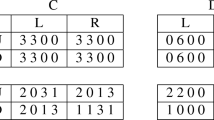Abstract
This paper examines the subgame-perfect equilibria in discounted stochastic games with finite state and action spaces. The fixed-point characterization of equilibria is generalized to unobservable mixed strategies. It is also shown that the pure-strategy equilibria consist of elementary subpaths, which are repeating fragments that give the acceptable action plans in the game. The developed methodology offers a novel way of computing and analyzing equilibrium strategies that need not be stationary nor Markovian.




Similar content being viewed by others
References
Abreu D (1986) Extremal equilibria of oligopolistic supergames. J Econ Theory 39(2):191–225
Abreu D (1988) On the theory of infinitely repeated games with discounting. Econometrica 56(2):383–396
Abreu D, Pearce D, Stacchetti E (1986) Optimal cartel equilibria with imperfect monitoring. J Econ Theory 39(1):251–269
Abreu D, Pearce D, Stacchetti E (1990) Toward a theory of discounted repeated games with imperfect monitoring. Econometrica 58(5):1041–1063
Amir R (2003) Stochastic games in economics and related fields: an overview. In: Neyman A, Sorin S (eds) Stochastic games and applications, NATO Science, vol 570. Kluwer, Dordrecht, pp 455–470
Atkeson A (1991) International lending with moral hazard and risk of repudiation. Econometrica 59(4):1069–1089
Aumann RJ (1981) Survey of repeated games. Essays in game theory and mathematical economics in Honor of Oskar Morgenstern. Bibliographisches Insitut, Mannheim, pp 11–42
Balbus L, Reffett K, Wozny L (2013) Markov stationary equilibria in stochastic supermodular games with imperfect private and public information. Dyn Games Appl 3:187–206
Balbus L, Reffett K, Wozny L (2014) A constructive study of Markov equilibria in stochastic games with strategic complementarities. J Econ Theory 150:815–840
Berg K (2013) Extremal pure strategies and monotonicity in repeated games. Working paper
Berg K, Kärki M (2014) An algorithm for finding the minimal pure-strategy subgame-perfect equilibrium payoffs in repeated games. Working paper
Berg K, Kitti M (2012) Equilibrium paths in discounted supergames. Working paper
Berg K, Kitti M (2013) Computing equilibria in discounted \(2\times 2\) supergames. Comput Econ 41(1):71–88
Berg K, Kitti M (2014) Fractal geometry of equilibrium payoffs in discounted supergames. Fractals 22(4). doi:10.1142/S0218348X14500169
Berg K, Schoenmakers G (2014) Construction of randomized subgame-perfect equilibria in repeated games. Working paper
Blackwell D, Ferguson TS (1968) The big match. Ann Math Stat 39(1):159–163
Borkovsky RN, Doraszelski U, Kryukov Y (2010) A user’s guide to solving dynamic stochastic games using the homotopy method. Oper Res 58(2):1116–1132
Burkov A, Chaib-Draa B (2010) An approximate subgame-perfect equilibrium computation technique for repeated games. In: Proceedings of the twenty-fourth AAAI conference on artificial intelligence, pp 729–736
Cole HL, Kocherlakota N (2001) Dynamic games with hidden actions and hidden states. J Econ Theory 98:114–126
Cronshaw MB (1997) Algorithms for finding repeated game equilibria. Comput Econ 10:139–168
Doraszelski U, Pakes A (2007) A framework for applied dynamic analysis in IO. In: Armstrong M, Porter R (eds) Handbook of industrial organization 3, pp 1887–1966, North-Holland
Doraszelski U, Escobar JF (2012) Restricted feedback in long term relationships. J Econ Theory 147(1):142–161
Ericson R, Pakes A (1995) Markov-perfect industry dynamics: a framework for empirical work. Rev Econ Stud 62(1):53–82
Feng Z, Miao J, Peralta-Alva A, Santos MS (2014) Numerical simulation of nonoptimal dynamic equilibrium models. Int Econ Rev 55(1):83–110
Filar J, Vrieze K (1997) Competitive markov decision processes. Springer, Berlin
Fink AM (1964) Equilibrium in stochastic n-person games. J Sci Hiroshima Univ Univ Ser A-I 28:89–93
Flesch J, Thuijsman F, Vrieze OJ (1997) Cyclic Markov equilibria in stochastic games. Int J Game Theory 26:303–314
Flesch J, Thuijsman F, Vrieze OJ (2000) Almost stationary \(\epsilon \)-equilibria in zero-sum stochastic games. J Optim Theory Appl 105(2):371–389
Fudenberg D, Yamamoto Y (2011) The folk theorem for irreducible stochastic games with imperfect public monitoring. J Econ Theory 146:1664–1683
Govindan S, Wilson R (2009) Global Newton method for stochastic games. J Econ Theory 144:414–421
Herings JJ, Peeters R (2004) Stationary equilibria in stochastic games: structure, selection and computation. J Econ Theory 118(1):32–60
Hörner J, Sugaya T, Takahashi S, Vieille N (2011) Recursive methods in discounted stochastic games: an algorithm for \(\delta \rightarrow 1\) and a folk theorem. Econometrica 79(4):1277–1318
Judd K, Yeltekin Ş, Conklin J (2003) Computing supergame equilibria. Econometrica 71:1239–1254
Kitti M (2013a) Conditional Markov equilibria in discounted dynamic games. Math Methods Oper Res 78:77–100
Kitti M (2013) Subgame perfect equilibria in discounted stochastic games. Working paper
Levy Y (2013) Discounted stochastic games with no stationary Nash equilibrium: two examples. Econometrica 81(5):1973–2007
Levy Y, McLennan A (2015) Corrigendum to: discounted stochastic games with no stationary Nash equilibrium: two examples. Econometrica (to appear)
MacDermed L, Narayan KS, Isbell CL, Weiss L (2011) Quick polytope approximation of all correlated equilibria in stochastic games. In: Proceedings of the twenty-fifth AAAI conference on artificial intelligence, pp 707–712
Mailath GJ, Samuelson L (2006) Repeated games and reputations: long-run relationships. Oxford University Press, Oxford
Mertens J-F, Parthasarathy TES (1987) Equilibria for discounted stochastic games. CORE discussion paper 8750, Universite Catholique de Louvain, Belgium
Mertens J-F, Parthasarathy TES (2003) Equilibria for discounted stochastic games. In: Neyman A, Sorin S (eds) Stochastic games and applications. NATO science series C, mathematical and physical sciences, vol 570. Kluwer, Dordrecht, pp 131–172
Murray C, Gordon GJ (2007) Multi-robot negotiation: approximating the set of subgame perfect equilibria in general-sum stochastic games. Adv Neural Inf Process Syst 19:1001–1008
Pakes A, Ericson R (1998) Empirical implications of alternative models of firm dynamics. J Econ Theory 79:1–45
Phelan C, Stacchetti E (2001) Sequential equilibria in a Ramsey tax model. Econometrica 69(6):1491–1518
Prasad H L, Prashanth LA, Shalabh B (2014) Algorithms for Nash equilibria in general-sum stochastic games. Working paper
Sen A, Shanno DF (2008) Optimization and dynamical systems algorithms for finding equilibria of stochastic games. Opt Method Softw 23(6):975–993
Shapley LS (1953) Stochastic games. Proc Natl Acad Sci USA 39:1095–1100
Sleet C, Yeltekin S (2015) On the computation of value correspondences for dynamic games. Dyn Games Appl. doi:10.1007/s13235-015-0139-1
Solan E, Vieille N (2001) Quitting games. Math Oper Res 26(2):265–285
Takahashi M (1964) Equilibrium points of stochastic non-cooperative n-person games. J Sci Hiroshima Univ Ser A-I 28:95–99
Thuijsman F, Vrieze OJ (1997) The power of threats in stochastic games. In: Bardi et al. (eds) Stochastic games and numerical methods for dynamic games, Birkhauser, pp 339–353
Yamamoto Y (2015) Stochastic games with hidden states. Working paper
Yeltekin S, Cai Y, Judd KL (2015) Computing equilibria of dynamic games. Working paper
Acknowledgments
The author is grateful for the reviewers’ comments and suggestions for improvements. The author acknowledges funding from Emil Aaltosen Säätiö through Post doc -pooli.
Author information
Authors and Affiliations
Corresponding author
Rights and permissions
About this article
Cite this article
Berg, K. Elementary Subpaths in Discounted Stochastic Games. Dyn Games Appl 6, 304–323 (2016). https://doi.org/10.1007/s13235-015-0151-5
Published:
Issue Date:
DOI: https://doi.org/10.1007/s13235-015-0151-5




